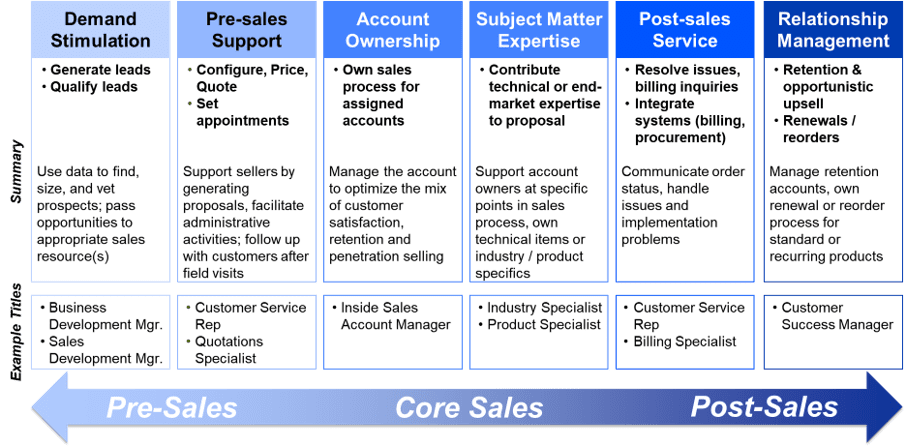How Remote Should Your Remote Sales Team Be?

The pandemic caused a major shift in the deployment of sales, marketing and service teams.
Over the past year, field sellers moved inside, either to a socially distanced office or to their home offices. As pandemic-related restrictions continue to lift, many sellers are returning to the field. Distribution has been a highly relationship-based industry, so sales leaders see a return to field selling and office-based inside selling & support as obvious and necessary moves.
However, those same sales leaders have experienced cost and productivity benefits from remote work. Lack of travel meant that time previously spent in a car or on a plane could be converted into additional customer video calls. Travel and expense budgets were zeroed out and operating expenses related to facilities were also cut. In many cases, productivity rose because customers responded better to video or phone calls instead of face-to-face visits.
Based on Alexander Group research, most field roles will once again travel, although not as much as before. Many distributors are redefining sales processes to put sellers at customer sites for only the most important interactions. This article focuses on the other big deployment question – for inside roles, should sales leaders deploy inside roles onsite (e.g., a bullpen in a headquarters or branch) or remotely (e.g., home office with systems connectivity)?
In the past few years, the number of inside-based commercial roles have proliferated. Alexander Group uses a framework to map these roles:

The deployment decision should consider three elements:
- Ability to effectively manage – Are managers able to provide the same level of coaching to direct reports working from home?
- Access to internal resources – Are individuals working from home able to access systems (e.g., dashboards, CRM), collaborate with colleagues, and acquire materials (e.g., product, collateral)?
- Availability of talent – Can we tap into new talent pools by recruiting outside the headquarters geography?
Demand Stimulation
- Ability to effectively manage – Business Development Manager (BDM) roles require a distinct management cadence, which is more effective when conducted face-to-face. BDMs tend to require constant oversight and measurement during onboarding. The BDM role has a higher turnover compared other inside roles due to its “churn and burn” or transactional nature, leaving BDMs on an island will only increase this risk.
- Access to internal resources – BDMs are generally able to access target lists remotely and can connect with colleagues via email, chat or CRM.
- Availability of talent – BDM talent is readily available in most primary and secondary markets.
- Recommendation: ALWAYS ONSITE – at least for onboarding/first 90 days, preferably for entire tenure.
Pre-sales Support
- Ability to effectively manage – Pre-sales roles are relatively process-driven, so a manager can effectively track a direct report’s metrics regardless of deployment.
- Access to internal resources – CSRs are able to connect with sellers and other colleagues remotely, however, accessing pricing software, configurators, and other tools may be complicated by bandwidth issues.
- Availability of talent – Talent is readily available in most primary and secondary markets.
- Recommendation: MOSTLY ONSITE – exceptions should be available provided that the individual has proper connectivity in a home office.
Account Ownership
- Ability to effectively manage – Often, the most powerful coaching comes via manager listen-ins or immediate post-call debrief. This is difficult, although not impossible, to do in a remote setting.
- Access to internal resources – Inside sellers are able to connect with specialists and other colleagues remotely.
- Availability of talent – Casting a nationwide net for inside sellers can quickly allow an organization to upgrade its talent.
- Recommendation: MIXED – if possible, keep new sellers in the headquarters or branch until they are seasoned enough to work remotely. In the moment coaching will greatly benefit productivity, skill acceleration and retention in the first 18-24 months.
Subject Matter Expertise
- Ability to effectively manage – Specialists can benefit from listen-ins, but they will most often have another seller on the call (because they are overlays) to provide peer-to-peer feedback.
- Access to internal resources – Specialists are able to connect with colleagues remotely, but may not have access to physical products or digital tools.
- Availability of talent – Similar to inside sellers, a larger talent pool can help find and retain the best experts in a particular product or technology.
- Recommendation: MOSTLY REMOTE – the talent upgrade outweighs the need for physical supervision for most companies. Also, specialists working remotely can structure their day so they can work across time zones, as these roles tend to be underpopulated in most organizations and support several sellers.
Post-sales Service
- Ability to effectively manage – Similar to Pre-sales roles, these roles are process-driven, do not require face-to-face oversight.
- Access to internal resources – Issue resolution time is the key metric for these roles, so any delays in connectivity should be avoided. Remote deployment presents a risk based on an individual’s home internet quality.
- Availability of talent – Talent is readily available in most primary and secondary markets.
- Recommendation: ALWAYS ONSITE – the risk of delays due to connectivity is too great to chance remote deployment. Also, load balancing is generally more effective when teams are under a single roof. Shift staggering is more effective than remote deployment across time zones to manage 24/7 customer requests.
Relationship Management
- Ability to effectively manage – Customer success is a new role to most distribution sales organizations, so in-person management is preferred until the role becomes mainstreamed.
- Access to internal resources – This role may need to access sellers as well as support personnel, so having the ability to walk the halls when needed tends to improve productivity.
- Availability of talent – Talent is generally available in most primary and secondary markets.
- Recommendation: MOSTLY ONSITE – at least until this role is commonplace in an organization; in the meantime, ability to interact with a manager and peers in the moment will help these roles share best practices and collaborate on sales tactics.
All recommendations are based on well-focused and defined roles. Alexander Group’s benchmarks on the above roles show that focus and appropriate role ratios are the two biggest drivers of productivity (e.g., sales volume, throughout). Hybrid roles exist in the industry, but deployment recommendations will depend on the unique nature of that role.
For more information, please contact a practice leader to discuss inside sales deployment recommendations, role definition, or productivity improvement opportunities.